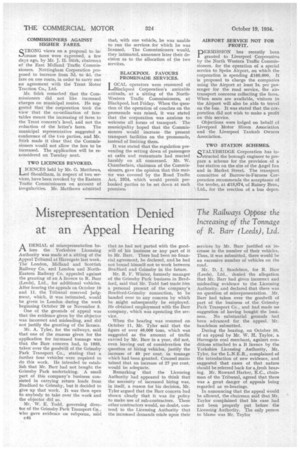Misrepresentation Denied at an Appeal Hearing
Page 70

If you've noticed an error in this article please click here to report it so we can fix it.
The Railways Oppose the Increasing of the Tonnage of R. Barr (Leeds), Ltd.
A DENIAL of misrepresentation bePI fore the Yorkshire Licensing Authority was made at a sitting of the Appeal Tribunal at Harrogate last week. The London, Midland and Scottish Railway Co. and London and NorthEastern Railway Co. appealed against the granting of an A licence to R. Barr (Leeds), Ltd., for additional vehicles. After hearing the appeals on October 10 and 11. the Tribunal reserved judgment, which, it was intimated, would be given in London during the week beginning October 29 or November 5.
One of the grounds of appeal was that the evidence given by the objector was incorrect and misleading, and did not justify the granting of the licence.
Mr. A. Tyler, for the railways, said that one of the reasons given for the application for increased tonnage was that the Barr concern had, in 1933, taken over the goodwill of the Grimsby Park Transport Co., stating that a further four vehicles were required to do this work. Ile intended to establish that Mr. Barr had not bought the Grimsby Park undertaking. A small part of this company's business consisted in carrying return loads from Bradford to Grimsby, but it decided to give up that work. It was then open to anybody to take over the work and the objector did so.
Mr. W. E. Todd, governing director of the Grimsby Park Transport Co., who gave evidence on subpcena, said c48 that he had not parted with the goodwill of his business or any part of it to Mr. Barr. There had been no financial agreement, he declared, and he had not bound himself, not to work between Bradford and Grimsby in the future.
Mr. R. F. Winter, formerly manager of the Grimsby Park business in Bradford, said that Mr. Todd had made him a personal present of the company's Bradford-Grimsby connection, to be handed over to any concern by which he might subsequently be employed. He obtained employment with the Barr company, which was operating the service.
When the hearing was resumed on October 11, Mr. Tyler said that the figure ot over 40,000 tons, which was suggested as the amount of traffic carried by Mr. Barr in a year, did not, even leaving out of consideration the question of hiring vehicles, justify the increase of 40 per cent, in tonnage which bad been granted. Counsel maintained that an increase of 27 per cent. would be adequate.
Remarking that the Licensing Authority had appeared to think that the necessity of increased hiring was, in itself, a reason for his decision, Mr. Tyler argued that the Barr concern had shown clearly that it was its policy to make use of sub-contractors. These other contractors would, no doubt, contend to the Licensing Authority that the increased demands made upon their
services by Mr. Barr justified an increase in the number of their vehicles. Thus, it was submitted, there would be an excessive number of vehicles on the road.
Mr. D. I. Sandelson, for R. Barr (Leeds), Ltd., denied the allegation that Mr. Barr had given incorrect and misleading evidence to the Licensing Authority, and declared that there was no question of misrepresentation. Mr. Barr had taken over the goodwill of part of the business of the Grimsby Park Transport Co., and had made no suggestion of having bought the business. No substantial grounds had been advanced for the appeal, Mr. Sandelson submitted.
During the hearing, on October 10, of an appeal by Mr. W. H. Taylor, a Harrogate coal merchant, against conditions attached to a B licence by the Yorkshire Licensing Authority, Mr. Tyler, for the L.N.E.R., complained of the introduction of new evidence, and suggested that cases of that nature should be referred back for a fresh hearing. Mr. Rowand Harker, K.C., chairman of the Tribunal, agreed that there was a great danger of appeals being regarded as re-hearings.
In announcing that the appeal would be allowed, the chairman said that Mr. Taylor complained that his case had not been properly put before the Licensing Authority. The only person to blame was Mr. Taylor












































































































